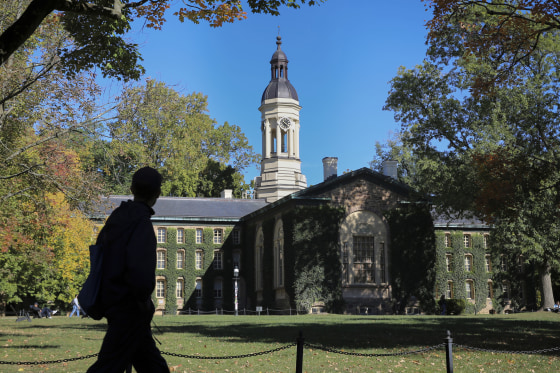Trump Administration’s Bold Stance Against Antisemitism: Ivy Leagues Scrutinized
Taking a firm stance on the issue of antisemitism, the Trump administration has indicated its seriousness about tackling this deep-rooted problem by monitoring financial aid to leading universities. One such institution that has felt the effects of this approach is Princeton University, one of the prestigious Ivy League schools. This week, the university experienced an unprecedented situation when a multitude of federal grants were suspended.
Princeton’s President, Christopher L. Eisgruber, communicated this development to the staff, faculty, and students in an official email late Tuesday morning. He indicated that while the complete reasoning behind this drastic measure wasn’t yet fully disclosed, Princeton University’s reaction would be guided by key principles. Eisgruber clarified his stance, stating that the University will always follow the rule of law.
The president emphasized the university’s commitment towards uprooting antisemitism and any other forms of discrimination. Showcasing an openness to cooperate with government initiatives, Eisgruber stated that Princeton would not hesitate to assist in any capacity to help defeat antisemitism. This statement made it clear that partnering with the authorities in this fight against discrimination was a priority for Princeton.
Eisgruber underlined the significance of protecting the academic freedom and due process rights of Princeton University. It suggested that any outcome would need to balance compliance with the government’s concerns and maintaining the academic integrity and autonomy of the institution. He reassured the educational community that Princeton would stand firm in its mandate.
Earlier in the week, Princeton had been alerted about changes to their research funding by the Department of Defense, the Department of Energy, and NASA. The specifics of the financial implications were not officially disclosed, but it was evident that the university would be significantly impacted by the sudden decision.
While the White House was yet to release any official comment on the matter, it was clear that the Trump administration was determinedly taking measures to enforce its policies. The elite universities have been subjected to intense scrutiny over the past few months. The financial blow to Princeton was not an isolated incident.
Earlier this year, the administration displayed the same resolve towards Columbia University. The renowned institution faced a substantial reduction of about $400 million in the forms of grants and contracts from Washington. This drastic move was viewed as a testament to the seriousness of the administration’s intent.
Another Ivy League institution, the University of Pennsylvania, was also not exempt from these stringent measures. The Trump administration had earlier suspended nearly $175 million of its funding. The financial strain these institutions were put under was a clear warning to all universities of the consequences of non-compliance with government regulations.
In addition to Princeton, Columbia, and Pennsylvania, Harvard University was also under close examination by the Trump administration. Around $9 billion worth of contracts and affiliations were under review. This investigation, carried out on such a grand scale, reinforced the point that no prestigious institution is beyond the reach of these measures.
The financial implications of these suspensions are profound. Elite institutions like Princeton and the others in the Ivy League rely heavily on these funds for critical research and development. Such actions are seen as a major disruption to the operations of these institutions, but necessary in achieving the ultimate goal of rooting out discrimination.
The Trump administration has conveyed a clear message: withholding financial assistance from Ivy League universities if they do not meet certain standards set by the government. Such strong actions against long-established institutions signal a bold approach to policy enforcement, striking at the very heart of these renowned centers of learning.
The suspensions are not random punitive measures but are believed to be part of a carefully crafted strategy from the Trump administration. Its intent is to coerce compliance with its policies and encourage active collaboration in the battle against antisemitism and other social evils. The administration firmly believes that no institution, no matter how prestigious, is above the country’s rules and regulations.
The university need not necessarily see this as a black mark but rather as an opportunity to evaluate and improve their existing practices. With earnest intent and participation in the government’s initiatives against antisemitism, a resolution could potentially be reached that would allow restoration of the suspended financial aid.
The Trump administration has not ruled out further actions if necessary. The clear message for all universities, not only those in the Ivy League, is that the fight against antisemitism is a non-negotiable priority. And that priority is driving the Trump administration’s policy and funding decisions at the highest level.
In conclusion, while these developments are initially perceived as financially challenging for the Ivy League universities, they may be a stepping stone towards fostering a better and more inclusive society. The Trump administration maintains an unwavering commitment towards eradicating antisemitism, firmly believing that the active participation of these elite education institutions can make a considerable difference in this battle against discrimination.



